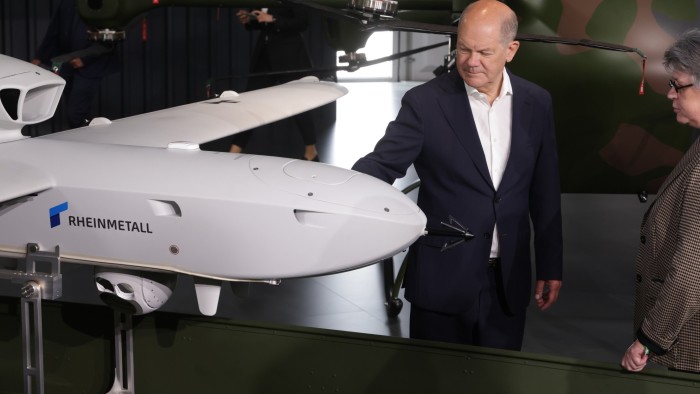Stay informed with free updates
Simply sign up to the Aerospace & Defence myFT Digest — delivered directly to your inbox.
Germany’s largest defence company Rheinmetall is working with a US software specialist to develop common operating standards to control autonomous battlefield drones, in a move that promises to shake up the rapidly evolving industry.
Under the partnership, Rheinmetall will integrate its drones with software developed by Virginia-based Auterion with the aim of setting up a military-wide system.
“In a general shift from manned to unmanned systems, it is crucial that the autonomous systems can talk to each other,” said Lorenz Meier, chief executive of Auterion, whose software is already being used by drones in Ukraine.
Russia’s full-scale invasion of Ukraine almost three years ago has turbocharged the development of drones and other autonomous systems, creating what the industry calls “software-defined” warfare that combines precision with scale. For these systems to proliferate and work together, a common operating standard is required.
Auterion’s operating system would allow the “customer to combine all drones on a common basis and to integrate different manufacturers into a common architecture”, Meier said.
With more than “two hundred different aerial unmanned systems” operating in Ukraine, “military training is very costly and time-consuming, and system interoperability is not guaranteed”, said Timo Haas, chief digital officer of Rheinmetall.
The “development of a homogeneous operating system will enable the efficient and scalable deployment of unmanned systems”, he added.
Auterion, along with other companies, is already part of an initiative by the US Department of Defense to develop an open-source standard for autonomous systems. The company hopes its partnership with Rheinmetall will help to drive a similar approach among Nato allies.
If “every country in Nato has its own drone communications standard, Nato would not be able to fight together”, said Meier, who sees the partnership with Rheinmetall as an important evolutionary step in the defence industry.
Rheinmetall, which makes tanks and infantry fighting vehicles, as well as combat drones, has emerged as one of the big corporate winners of the war in Ukraine and increased defence spending by European governments.
Armin Papperger, its chief executive, has been vocal about the impact that artificial intelligence will have on warfare. He told the Financial Times in October that soldiers would increasingly rely on AI to make the “right decision”.
“An example: You have five different tanks on your side and 20 on the enemy side and the AI gives you the information which one of your tanks is best placed to hit the enemy, and which enemy you should fight against.”
Read the full article here

